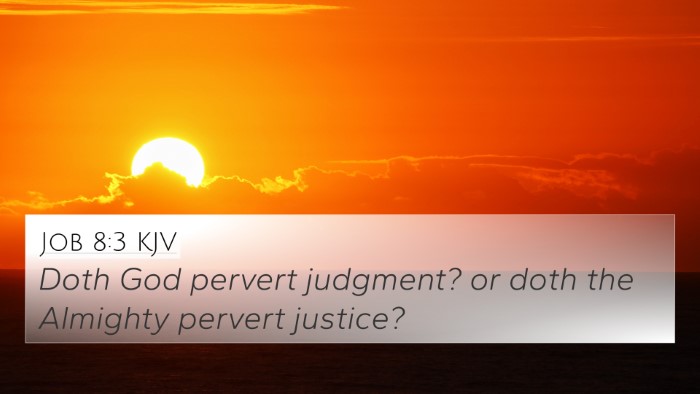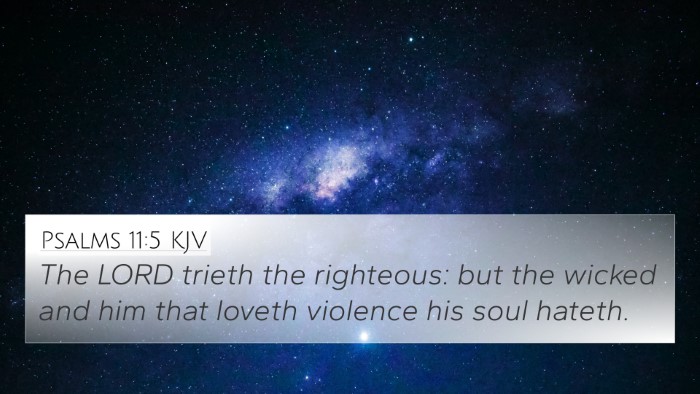Understanding Romans 3:6
Romans 3:6 states, "God forbid: for then how shall God judge the world?" This verse forms part of the Apostle Paul's discourse on justification and the righteousness of God in the epistle to the Romans. The context is essential for grasping the profound implications of this statement.
Combined Insights from Public Domain Commentaries
This analysis harnesses interpretations from notable Biblical commentaries by Matthew Henry, Albert Barnes, and Adam Clarke, intertwining their insights to present a holistic understanding of the verse.
Contextual Analysis
The preceding verses articulate the universal condition of humanity under sin and the fate of both Jew and Gentile before God.
In Romans 3:5, Paul addresses an argument suggesting that human sinfulness may illuminate God's righteousness. He vehemently refutes the notion that sin can enhance God's glory, leading to his rhetorical inquiry in 3:6.
Theological Implications
-
Divine Justice: Paul vehemently emphasizes that if God were to condone sin under the guise of magnifying His grace, it would fundamentally undermine His role as a just judge. According to Matthew Henry, this presents a clear vision of God as a being of integrity and righteousness.
-
The Seriousness of Sin: The commentary of Albert Barnes notes that this verse not only highlights the necessity of upholding divine righteousness but also underscores the severity of sin, reminding believers that sin cannot be justified through a supposed good outcome.
-
The Character of God: Adam Clarke points out that the question posed by Paul serves as a reminder of God's immutable nature, acting with justice both in punishment and in the overarching narrative of salvation history.
Connections to Other Scriptures
Thematic connections can be established between Romans 3:6 and various other Bible verses. These connections enhance comprehension through inter-Biblical dialogue, demonstrating the consistency of God's character and the theme of justice throughout the Scriptures.
- Romans 2:6: "Who will repay each person according to what they have done." This verse complements the idea of God's judgment and reinforces the importance of justice.
- Hebrews 9:27: "Just as people are destined to die once, and after that to face judgment." This highlights the certainty of divine judgment after earthly life.
- Psalm 7:11: "God is a righteous judge, a God who displays his wrath every day." This verse mirrors the thematic foundation of God's judgment that Paul asserts in Romans.
- Galatians 6:7: "Do not be deceived: God cannot be mocked. A man reaps what he sows." This underlines the principle of divine justice that is central to Romans 3:6.
- 2 Thessalonians 1:5-7: This passage speaks to the righteousness and justice of God in addressing wrongdoings, which echoes the concerns raised in Romans.
- 1 Peter 4:5: "But they will have to give account to him who is ready to judge the living and the dead." Here, the focus is again on God’s upcoming judgment.
- Matthew 12:36: "But I tell you that everyone will have to give account on the day of judgment for every empty word they have spoken." This reinforces the accountability theme present in Paul’s argument.
- James 2:13: "Because judgment without mercy will be shown to anyone who has not been merciful." This underscores God’s expectation of justice and mercy intertwined.
- Romans 14:10: "For we will all stand before God's judgment seat." This reiterates the inevitability of judgment and aligns with Romans 3:6.
- Revelation 20:12: "And I saw the dead, great and small, standing before the throne, and books were opened." This culminates the scriptural narrative on divine judgment, tying back to the foundational principles in Romans.
The Importance of Cross-Referencing
The practice of cross-referencing Biblical texts is invaluable for readers seeking to understand the connections between various scriptures. Utilizing tools for Bible cross-referencing can enrich the study experience, providing insights into the interplay of themes and teachings across different books of the Bible.
Tools for Bible Cross-Referencing
There are numerous Bible reference resources available that assist with identifying links between verses, such as a bicycle concordance or a comprehensive bible cross-reference guide. Engaging with these tools can help in performing a comparative Bible verse analysis or a cross-reference Bible study.
Learning How to Use Cross-References
To effectively utilize cross-referencing in your studies, consider the following steps:
- Identify Key Themes: Focus on specific themes within the verse.
- Search for Related Verses: Use a concordance to find scriptures that discuss similar themes.
- Create a Linkage: Analyze how the verses relate to one another in their message and theology.
- Reflect on Application: Think about how these connections deepen your understanding of the scripture’s meaning for your life.
Conclusion
Romans 3:6 serves as a powerful reminder of God's nature as a righteous judge, emphasizing the seriousness of sin and our collective accountability before Him. The combined insights from various commentaries and the connections drawn with other Biblical verses demonstrate the richness of scripture. Through diligent study and cross-referencing, believers can gain a deeper understanding of God's Word and the cohesive narrative of redemption and justice it presents.












